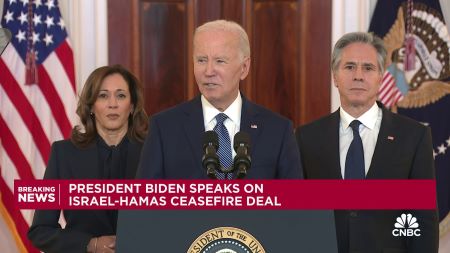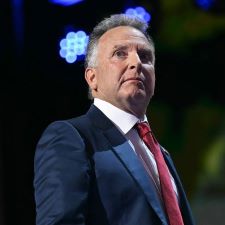The High-Stakes Deal That Tested Rivalry and Diplomacy in the Middle East
THE GAZA ceasefire deal came as a win for Donald Trump, even before he started his next stint as the 47th American President. Though both the outgoing and incoming presidents—Biden and Trump—claimed it as their victory, in real terms, the deal fructified due to Trump’s adamant and no-nonsense attitude in dealing with Netanyahu.
The Israeli Prime Minister’s office was the last to confirm early Friday morning (17 January 2025) that a deal had been agreed upon with Hamas. The agreement, which U.S. officials expected to take effect Sunday (19 January), would see a pause in fighting in Gaza and lead to the phased release of hostages and Palestinian prisoners.
 The deal includes a temporary ceasefire and involves three further phases of negotiations related to the release of hostages and the shape of the new governing authority in Palestine.
The deal includes a temporary ceasefire and involves three further phases of negotiations related to the release of hostages and the shape of the new governing authority in Palestine.
The deal finally allowed displaced Palestinians to return to their homes—though after Israel’s deliberate destruction campaign, which increased in ferocity, resulting in the deaths of 86 Palestinians after the announcement of the deal and rendering many homes no longer habitable.
But the Palestinians of the occupied territories wanted to return to their homeland as soon as possible, and they welcomed the announcement with cheers and tears.
Qatar’s Prime Minister, Sheikh Mohammed bin Abdulrahman bin Jassim Al Thani, had said on Wednesday (15 January) that the ceasefire deal would come into effect on Sunday, but added that work on implementation steps with Israel and Hamas was continuing.
Apparently, the American President-elect, Donald Trump, wanted the deal to be effective before his inauguration ceremony.
 Trump had repeatedly indicated during his election campaign that he would prefer to avoid inheriting the Israel-Hamas war as he prepared to take office on 20 January, and analysts say his impending return to the White House had injected renewed urgency into negotiations on a deal.
Trump had repeatedly indicated during his election campaign that he would prefer to avoid inheriting the Israel-Hamas war as he prepared to take office on 20 January, and analysts say his impending return to the White House had injected renewed urgency into negotiations on a deal.
Reportedly, Trump and outgoing U.S. President Joe Biden both took full credit following the announcement of the ceasefire deal Wednesday after the two American administrations worked together to mediate the truce.
The cooperation between the two camps was “almost unprecedented,” a senior Biden administration official said after the deal was clinched, made possible by a rare intersection of interests between bitter rivals who both saw an opening following Trump’s election victory.
The Winner: Biden or Trump?
Trump had made a big issue of Middle East peace during his presidential campaign and attacked Biden’s failure to secure a ceasefire. Steve Witkoff, his surprise appointment as Middle East envoy, was dispatched to Qatar on 22 November—less than three weeks after his election victory—with strict instructions to get the deal clinched.
Witkoff, a close friend of Trump who is also known to Qatari officials through his real estate business, had suddenly become the chief negotiator in an unlikely negotiating team led by Biden’s top Middle East adviser, Brett McGurk. In directing their envoys to coordinate, Biden and Trump both temporarily put aside their fierce personal and political rivalry—a small miracle in its own right. But the deal has definitely added to the pragmatism and astuteness of Trump’s stature as a politician.
 Reportedly, as per behind-the-scenes reportage published on the news website Axios, Biden and his team set a Gaza deal as their key foreign policy goal for the remaining 10 weeks in the White House.
Reportedly, as per behind-the-scenes reportage published on the news website Axios, Biden and his team set a Gaza deal as their key foreign policy goal for the remaining 10 weeks in the White House.
Though the deal as proposed by the Biden administration had been on the table since May 2024, the real push to the efforts was given by Trump after his meeting, following his election victory, with the outgoing President Biden in the Oval Office.
Later, prompted by Senator Lindsey Graham, Trump posted on his social media platform, Truth Social, that if the hostages were not freed by 20 January, “There will be ALL HELL TO PAY in the Middle East, and for those in charge.”
That created a sense of urgency for the Qatari and Egyptian mediators, but also for Netanyahu, sources familiar with the talks say. Several days later, Sullivan and McGurk traveled to Israel and met Netanyahu. The Prime Minister told them he wanted a deal on Trump’s timeline.

Steve Witkoff
Reportedly, intense diplomatic efforts preceded the deal announcement, with Witkoff traveling back to Doha to join McGurk for 96 hours of intense diplomatic negotiations. In another unusual step, the two met together with Qatari Emir Sheikh Tamim bin Hamad al-Thani.
Reportedly, the final sprint in the negotiations took place at a Qatari government official residence. Hamas representatives were on the first floor, with the Israelis on the second, and the Qatari and Egyptian mediators shuttled between them.
Both sides discussed and closed issue after issue, like the redeployment of Israeli forces; what Hamas must do during the ceasefire; the delivery of humanitarian aid; and the sequencing of hostage and prisoner releases.
On Wednesday afternoon, Hamas came back for a meeting with the Qatari and Egyptian mediators and gave its official positive response. After the Israeli Prime Minister’s office confirmed the deal, Netanyahu called Trump and thanked him for his help in getting the deal. Only then did he call to thank Biden.
 This again leads us back to the issue of who was the real winner in this high-stakes deal. Though the efforts started during President Biden’s tenure, the real push was given by Trump.
This again leads us back to the issue of who was the real winner in this high-stakes deal. Though the efforts started during President Biden’s tenure, the real push was given by Trump.
Donald Trump can be described as a pragmatic, astute businessman—the same traits he brings to his political actions. He is ready to discard the old political shenanigans, as he is not cut from the same cloth as usual politicians. Thus, he often takes decisions that confound politicians and diplomats alike, as they lead to quick, winnable results.
But to achieve all this, he doesn’t give up his business goals. Reportedly, Trump and his son-in-law Jared Kushner have vast business investments in Israel. These investments were suffering from the continued war, so in a manner, he has tried to end the war to guard his family’s financial interests and also convey to the Israelis how he will treat them in the next four years.
In sum, the Gaza ceasefire could be described as Trump’s legacy while also identifying the future action plan for the Middle East, guided by his financial interests. ![]()
Also Read: Trump’s Unspoken Strategy or Ambiguity?
Disclaimer : PunjabTodayNews.com and other platforms of the Punjab Today group strive to include views and opinions from across the entire spectrum, but by no means do we agree with everything we publish. Our efforts and editorial choices consistently underscore our authors’ right to the freedom of speech. However, it should be clear to all readers that individual authors are responsible for the information, ideas or opinions in their articles, and very often, these do not reflect the views of PunjabTodayNews.com or other platforms of the group. Punjab Today does not assume any responsibility or liability for the views of authors whose work appears here.
Punjab Today believes in serious, engaging, narrative journalism at a time when mainstream media houses seem to have given up on long-form writing and news television has blurred or altogether erased the lines between news and slapstick entertainment. We at Punjab Today believe that readers such as yourself appreciate cerebral journalism, and would like you to hold us against the best international industry standards. Brickbats are welcome even more than bouquets, though an occasional pat on the back is always encouraging. Good journalism can be a lifeline in these uncertain times worldwide. You can support us in myriad ways. To begin with, by spreading word about us and forwarding this reportage. Stay engaged.
— Team PT

